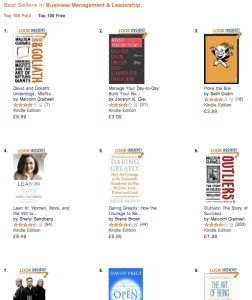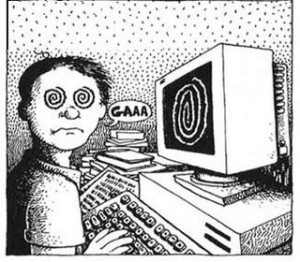Writing my book ‘OPEN: How We’ll Work, Live and Learn In The Future’ has been the biggest learning experience of my life. I’d like to share the key lessons with you, in the hope that it might encourage you, or your students. The last time I was immersed in a prolonged creative activity like this was when I was a singer-songwriter – many years ago – and the parallels between the book industry and the record industry, have been both instructive and illuminating.
Lesson #1: FInd Your Voice Before You Start
This one I remembered from my time as a songwriter. Record companies were forever asking me to write a song that sounded like, well, whoever was in the charts at the time. After chasing my own tail for a couple of years (by the time you’d got the ‘tribute’ style licked ,the world had moved on…) I realised that whatever voice I naturally had, was lost in the process of mimicry.
So this time, I kept a regular blog for two years, before I began to even think about a book. That experience was, and remains, invaluable. Not only does a weekly blog post keep your writing muscles working, your natural voice emerges. I knew, having worked in education, that I didn’t want to write non-fiction for an academic audience. So, blogging’s conversational style suited me, and readers seemed to like it. I once worked with Sir Paul McCartney, and was astonished to discover that he never, ever warms his voice up before performing. I’ve never understood why. Blogging, for me, has been the equivalent of a vocal warm-up.
Lesson #2: Don’t Wait For The Perfect Writing Environment
That said, blogging is to writing a book, as sprinting is to running a marathon. I started writing the book after about a year of researching (Evernote, how can I thank you enough?). My blog posts are usually written on the run, but I realised that, to write a book, I’d need a concentrated period, in a place with few distractions, and a daily routine. So, I chose to spend a six-month, self-funded, sabbatical in Australia. It’s the equivalent of a band recording an album in the Caribbean, with predictably similar results. The distractions were plentiful, and the book stuttered along. I had a great time, though.
Lesson #3: Write, Then Research
I thought authors did all their research and then started writing. But at the point where my Evernote folder had over 500 entries, I couldn’t see the wood for the trees, nor how I should structure my arguments. At that point I received an email from another of my mentors, Sir Ken Robinson. “Don’t leave it too late, before you start writing” was all it said, and I knew he was right.
So I started writing, with only the barest sketch of a plot or a plan. And in the writing I recognised the book I really wanted to write, and that took me down roads I hadn’t anticipated, which then required further researching. I don’t know what it’s like for other non-fiction writers, but for me the researching and writing have gone almost hand in hand, not one before the other.
Lesson #4: Mentors Are Great, Critical Readers Are Even Better
Having name-dropped, allow me to mention the person who perhaps mattered most in the process: Tom, my ex-songwriting partner. Having the first couple of chapters done, I shared them with Tom, knowing that I’d get a no-nonsense, but sensitive, critique. He encouraged me to put more of myself into the book: my experiences, my stories. When I heard the same from another critical reader, I had to get over myself. This was a key moment, because I’d hitherto assumed that people expected non-fiction to be balanced and objective. Dull, in other words.
Lesson #5: Less Really Is More
Tom’s most valuable advice – ‘Less is More’ – is hardly original, but writers need to be reminded of it, constantly. Confusingly, by this time I’d found an agent, and he felt the first draft needed to be 15,000 words longer. So I kept writing….
Lesson #6: Get An Editor, But Trust Your Instincts
Once I’d hit nearly 80,000 words, even I thought it could do with a light trim. My newly acquired publisher, Crux Publishing, assigned an editor. I expected some nip and tucks, but what was proposed amounted to amputation. The version that was published (the 20th draft) was 20,000 words lighter. Taking out those witty diversions felt like infanticide, but what emerged was a tighter, punchier, flow.
Handing the manuscript over to someone who will be ruthless in their criticism is crucial, but there were a number of times when I felt my voice was being lost. Unlike my days in the music business, this time I held out.
Lesson #7: Don’t Think You’ve Finished When You’ve Finished
Oh no, you’ve barely started. When you’ve lived with a book for 3 years, the process of line and copy-editing is like banging your head against a metallic sharp object. All you want to do is stop. It’s tedious, boring and repetitive. I got through it by reminding myself that I now never listen to any of my songs , because I can’t bear the imperfect rhymes, or the bum notes being sung/played. I didn’t want to repeat that experience.
So, once it’s up on Amazon, your work is done right? Er, no…..
Lesson #8: Build Your Platform, First!
If I’d discovered Joanna Penn before I started I would have not only known what a ‘platform’ is, I would have had the thing built. The excitement of publication, quickly gives way to the realisation that no-one is going to do the marketing for you. I currently spend at least 2-3 hours every day tweeting, blogging, podcasting…it’s relentless. Tim Ferriss likens writing a book to launching a start-up company. I don’t like the grind of touting yourself around. But I like the idea of no-one reading my book even less.
Lesson #9: Don’t Get Hooked on Sales Figures:

During the first forty-eight hours of OPEN’s release I watched the Amazon Best Sellers lists in my chosen categories, with giddy excitement. One minute I was ahead of Seth Godin, the next I’d overtaken Malcolm Gladwell I later learned that this was the ‘friends and family’ effect of a new book being launched. Elation gave way to despair over the next few days, as the book slid steadily down those lists. II never expected the book to be a best-seller (even by the modest yardsticks of non-fiction) so I stopped looking. Well, almost.
Lesson #10 Enjoy The Moment , It May Never Come Around Again
Instead, I now appreciate the reader reviews, the lovely tweets, and the emails from people who tell me that my book has changed the way they see the world. You can’t put a price on that. Because of social media, I’m directly connected with lots of people who have read the book, and I’m rapidly becoming known as ‘that OPEN guy’. I’ve been called worse.


i found your presentation inspiring!